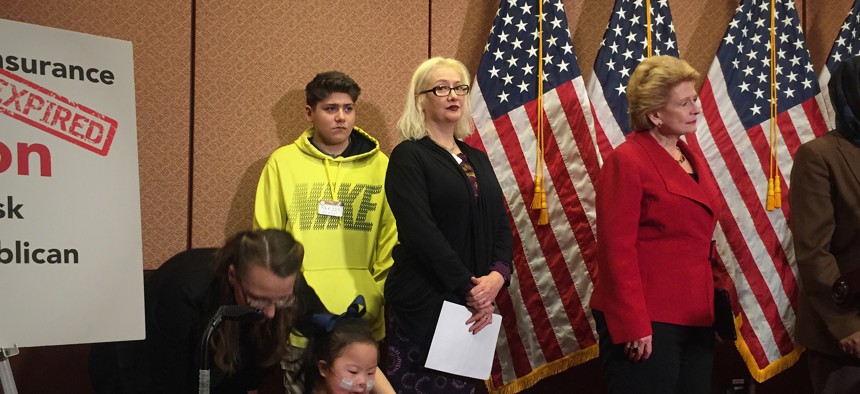Here’s What CHIP Means to This Pittsburgh Mom of Three

Connie Cavara (center) stands alongside her son, Diego, 13 as she waits to speak on behalf of the Children's Health Insurance Program. Quinn Libson/Route Fifty
“I think they need to see the faces of the mothers and children they’re impacting. We’re not numbers or budgets. We’re people.”
When Connie Cavara was pregnant with her daughter, Carmen, she got some scary news.
The doctors had noticed a mass on Carmen’s adrenal gland that was visible in an ultrasound. As soon as Carmen was born, she needed extensive testing to find out whether or not that mass was cancer—and what treatment she might subsequently need.
Fortunately for Cavara, Carmen, who just celebrated her fourth birthday, turned out to be perfectly healthy. But the testing it took to learn that certainly wasn’t cheap.
“Without CHIP, the medical expenses from all her testing would have buried us,” said Cavara, who traveled to Washington on Tuesday to speak alongside Democratic Sens. Casey, Stabenow and Hirono to push Congress to reauthorize the Children's Health Insurance Program, which provides health care coverage for two of her three children—and 9 million others across the country.
For the last 74 days, that coverage has been in jeopardy. But, in the midst of high-level discussions of federal match rates, and CHIP’s impact on state budgets, and the partisan roadblocks that are keeping a funding plan from making it through Congress, it’s possible to lose sight of the kids and moms and dads that are being affected by legislative inaction.

Cavara and her family are the typical CHIP beneficiaries. She makes too much money for her children to qualify for coverage under Medicaid, but she doesn’t bring home enough income to be able to afford private insurance. And her employer's health plan isn’t an option either.
“I do receive health care at work. I’m a nurse, and my health plan is good for me,” said Cavara. “But to add my family, the kids would be an extra $900 a month, and that’s almost an entire paycheck after they take taxes out. I can’t afford that. Without CHIP I don’t know how they’d have health care.”
The irony of her job in health care isn’t lost on Cavara. “As a nurse, I spend every day taking care of other people’s family members. Without CHIP I wouldn’t be able to take care of my own.”
Cavara has been following the CHIP issue closely, and she says she’s not alone among her circle of parents.
“Everyone is really worried,” Cavara told Route Fifty. “There are a lot of friends of mine with children with special needs and they have a lot of concerns. How are they going to provide this therapy for my child if this gets taken away? We all are very concerned.”
Cavara has turned that concern into political energy. She sends emails and makes phone calls to representatives in Washington, but says she doesn’t usually feel like she’s being heard.
When informed that officials in other states had begun mailing letters to beneficiaries to warn them that their coverage may get cut, she was aghast.
“How can they do that?” she asked, adding, “I think they need to see the faces of the mothers and children they’re impacting.”
“We’re not numbers or budgets. We’re people.”
Quinn Libson is a Staff Correspondent at Government Executive’s Route Fifty based in Washington, D.C.
NEXT STORY: New York City Has Its Own Fund to Bail People Out of Jail






